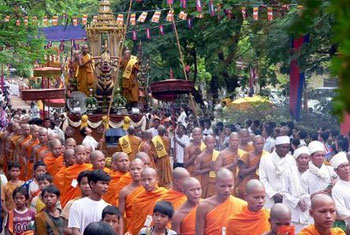Buddha relics brought from Sri Lanka stolen from Cambodian shrine
December 16, 2013 11:35 am
Cambodian police on Sunday said they were searching for a golden urn said to contain relics of the Buddha -- including hair, teeth and bones -- after it was stolen from a shrine.
The theft of several small statues and the urn from a mountain shrine in the former royal city of Udong was discovered on Tuesday, according to national police spokesman Kirt Chantharith.
The relics are “very important” to Cambodians -- the vast majority of whom are devout Buddhists, he added.
“Ninety percent of our people follow Buddhism and respect the Buddha and the remains are those of the Buddha,” Kirt Chantharith said.
“We don’t know where the urn is now. We are looking for it,” he said, adding five guards had been arrested in connection with the theft.
The relics are believed to have been brought from Sri Lanka to Cambodia in the 1950s to mark the 2,500th anniversary of Buddha’s birth.
In 2002, then king Norodom Sihanouk moved the relics from the capital Phnom Penh to Udong, some 45 kilometre (30 miles) from Phnom Penh -- in a ceremony attended by tens of thousands of people. - AFP
The theft of several small statues and the urn from a mountain shrine in the former royal city of Udong was discovered on Tuesday, according to national police spokesman Kirt Chantharith.
The relics are “very important” to Cambodians -- the vast majority of whom are devout Buddhists, he added.
“Ninety percent of our people follow Buddhism and respect the Buddha and the remains are those of the Buddha,” Kirt Chantharith said.
“We don’t know where the urn is now. We are looking for it,” he said, adding five guards had been arrested in connection with the theft.
The relics are believed to have been brought from Sri Lanka to Cambodia in the 1950s to mark the 2,500th anniversary of Buddha’s birth.
In 2002, then king Norodom Sihanouk moved the relics from the capital Phnom Penh to Udong, some 45 kilometre (30 miles) from Phnom Penh -- in a ceremony attended by tens of thousands of people. - AFP












